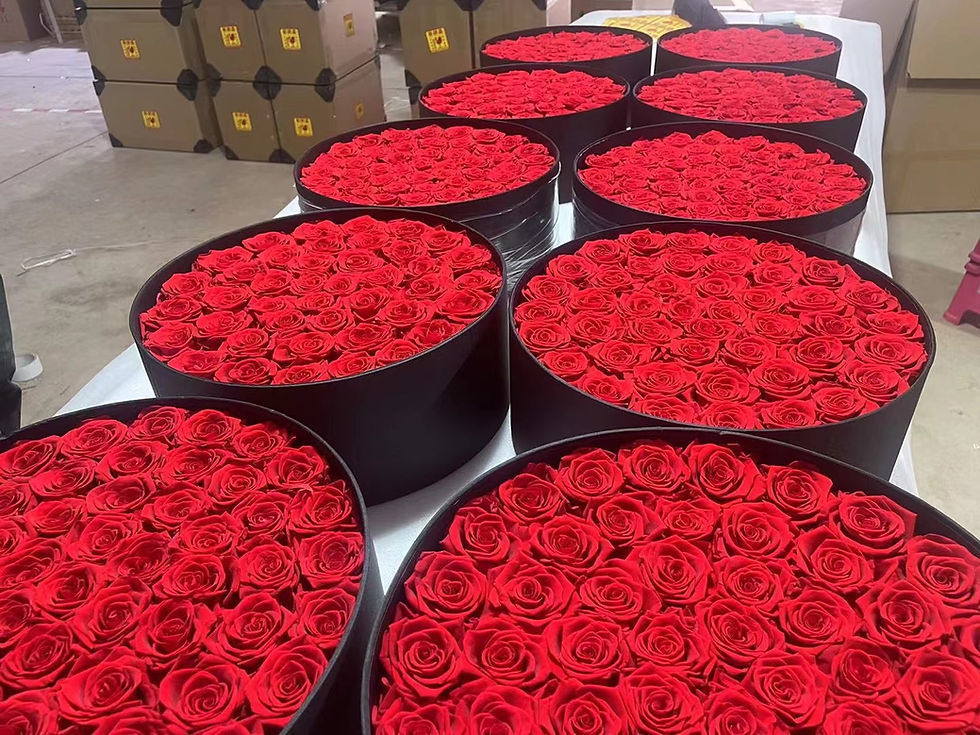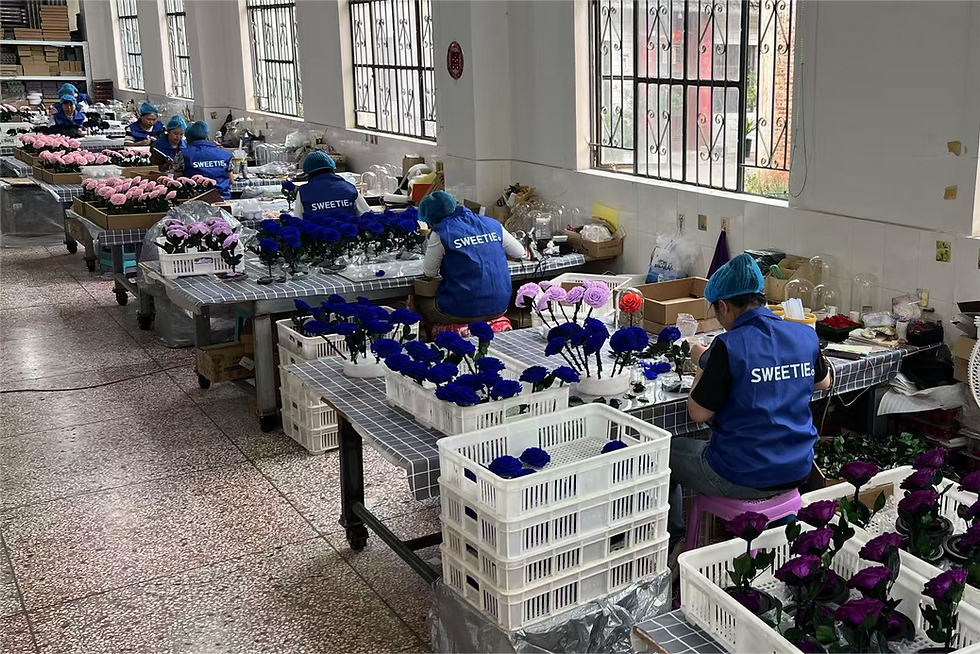How to Choose the Right Wholesale Rose Box Material: Acrylic, Paper, or Velvet
- Annie Zhang

- Aug 26, 2025
- 4 min read

Picture this: you finally secure a large order of preserved roses box. They look perfect in the factory photos. But when the shipment lands, the acrylic boxes are scuffed, or the velvet boxes arrive with lint, or the paperboard feels thinner than you expected. Suddenly, what was meant to be a premium gift looks ordinary, and your margins are squeezed.
That’s why choosing the right rose box material isn’t just a design decision—it’s a bottom-line decision. The box material determines three things at once:
How the product looks on the shelf
How safely it travels in bulk
How much unit cost and freight you carry
In this guide, I’ll break down acrylic, paper, and velvet rose boxes, highlight when each works best, and share the common pitfalls buyers often overlook.
Index:
1. Acrylic Rose Boxes
When to choose
Acrylic is the go-to material if your product needs to shine under store lights. Clear walls put every rose head on display, which is why mall counters and jewelry tie-in programs love them. Common formats include cube sizes around 15 × 15 × 15 cm, often with drawers for 9 to 16 rose heads.
Strengths
Maximum visibility
Rigid structure that holds its shape
Easy to wipe clean in stores
Watchouts
Prone to scratches if not wrapped with film during packing
Heavier than paperboard, which impacts air freight
Stress marks can appear if the box is too tight-fitting
Branding options
Screen printing, applied decals, or sleeves work better than trying to color the acrylic itself.
Use cases
Premium retail counters, jewelry crossover gifts, illuminated displays.
CTA: If you want us to suggest protective films and carton layouts for your acrylic program, send a note to sales@sweetie-group.com.

2. Paperboard Rose Boxes
When to choose
Paperboard is the most versatile and cost-effective choice. It comes in heart-shaped sizes
like 13 × 12.3 cm, 18 × 14 cm, 23 × 14 cm, and round formats up to 48 × 19 cm. These are staples for supermarkets, gift shops, and seasonal runs.
Strengths
Lowest cost per unit
Lightest weight for freight
Wide finishing menu: foil stamping, embossing, satin wraps
Watchouts
Durability depends on board thickness and closure strength
Satin fabric finishes look elegant but pick up dust more easily than coated paper
Always confirm caliper and magnet pull force before mass production
Branding options
Hot foil, embossing, printed sleeves, or logo plates.
Use cases
Supermarkets, chain gift stores, seasonal mass programs.
CTA: If you’d like a mixed swatch kit of coated paper vs. satin fabric finishes, email sales@sweetie-group.com.

3. Velvet Wrapped Rose Boxes
When to choose
Velvet is the material you pick when you want the box itself to feel like a gift. Typically used in mushroom or dome shapes (13, 15, and 19 cm diameters), velvet boxes pair beautifully with deep red or jewel-tone roses.
Strengths
Instant luxury perception
Rich color depth
Soft tactile feel that supports high-end positioning
Watchouts
Shows lint and fingerprints
Can bruise under compression, so packing and handling must be careful
Printing is difficult; badges and sewn labels are better
Branding options
Metal badges, foil tags, woven ribbon, or sewn-in labels.
Use cases
Boutique gifting, perfume and jewelry collabs, brand activation boxes.
CTA: If you’d like a sample velvet dome with custom ribbon and badge branding, contact sales@sweetie-group.com.

Side-by-Side Comparison
Attribute | Acrylic | Paperboard | Velvet Wrapped |
Presentation impact | Highest transparency, ideal for counters | Balanced look, many shapes and sizes | Premium luxury feel, tactile, romantic |
Durability in transit | Rigid but scratch-prone, needs edge guards | Good if board caliper and bracing are specified | Fabric can lint or bruise, needs dust bag |
Unit cost tendency | Highest | Lowest | Mid to high |
Freight behavior | Heavier, higher volumetric weight | Lightest, best for courier and air | Midweight, sensitive to compression |
Branding methods | Screen print, decals, sleeves | Foil stamp, emboss, print, sleeves | Badges, sewn labels, ribbons |
Typical catalog sizes | 15 × 15 × 15 cm cubes with drawers | Hearts (13–23 cm), rounds (23–48 cm) | Domes (13–19 cm) |
Best use cases | Jewelry tie-ins, mall displays | Mass retail, seasonal programs | Boutique gifting, collaborations |
Quick Decision Guide
Choose acrylic if visibility is everything and you’re selling at premium counters.
Choose paperboard if freight savings, volume, and wide customization are your top priorities.
Choose velvet if you want your box to scream “luxury gift” the moment it’s unwrapped.
Final Thoughts
No matter which material you pick, remember that the box is part of the product experience. For preserved roses—which are real roses that last more than a year with proper care—the right packaging not only protects the flowers but also elevates the perceived value.
At Sweetie-Gifts, we’ve been a rose box manufacturer for more than 16 years, with factories in Kunming and Yiwu. We supply heart, round, acrylic, and velvet rose boxes for some of the largest supermarket chains, wholesaler and brand collaborations worldwide. If you’d like tailored advice, we’re always happy to review your target price point, channel, and delivery needs before you place an order.

—Annie Zhang, CEO of Sweetie-Group










Comments